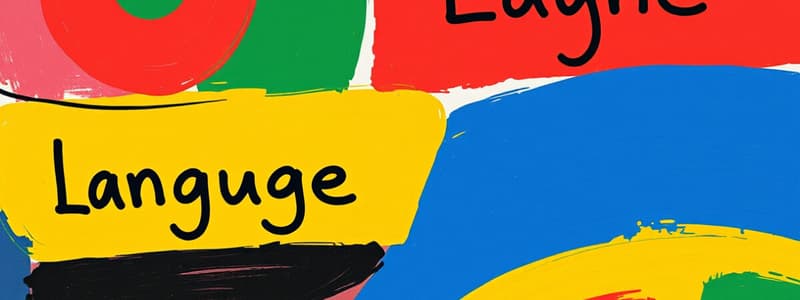Podcast
Questions and Answers
What does an imperative sentence do?
What does an imperative sentence do?
- Makes a statement
- Asks a question
- Gives a command (correct)
- Describes a scene
What is personification?
What is personification?
Applying human characteristics to an object.
What is anthropomorphism?
What is anthropomorphism?
Applying human characteristics to an animal.
What is technical language or jargon?
What is technical language or jargon?
What is a metaphor?
What is a metaphor?
What role do personal pronouns play in writing?
What role do personal pronouns play in writing?
What is a simile?
What is a simile?
What is an analogy?
What is an analogy?
What is onomatopoeia?
What is onomatopoeia?
What is pathetic fallacy?
What is pathetic fallacy?
What is alliteration?
What is alliteration?
What is assonance?
What is assonance?
What is hyperbole?
What is hyperbole?
What are rhetorical questions?
What are rhetorical questions?
What is humour in writing?
What is humour in writing?
What is an idiom?
What is an idiom?
What is repetition?
What is repetition?
What is sarcasm?
What is sarcasm?
What is satire?
What is satire?
What are dramatic verbs?
What are dramatic verbs?
What are word plays or puns?
What are word plays or puns?
What is the rule of three?
What is the rule of three?
What is emotive language?
What is emotive language?
What is an allegory?
What is an allegory?
Flashcards are hidden until you start studying
Study Notes
Language Techniques Summary
- Imperative Sentence: A sentence that commands or instructs.
- Personification: Giving human traits to inanimate objects.
- Anthropomorphism: Assigning human characteristics to animals, unlike objectification.
- Technical Language/Jargon: Subject-specific vocabulary used to convey expertise or impress an educated audience, sometimes overwhelming the reader.
- Metaphor: Directly stating one thing is another to create meaning.
- Personal Pronouns: Words like 'you' and 'we' that foster connection and empathy between the writer and the audience, influencing the reader's viewpoint.
- Simile: A comparison using 'like' or 'as' to highlight similarities between two different things.
- Analogy: A comparison made to clarify an idea or argument, demonstrating how one concept relates to another.
- Onomatopoeia: Words that mimic natural sounds; enhances realism and imagery in writing.
- Pathetic Fallacy: Attributing human emotions to nature, often reflecting characters' feelings through weather or environment.
- Alliteration: Repetition of initial consonant sounds in closely connected words for rhythm and emphasis.
- Assonance: Repetition of vowel sounds in nearby words to create a musical effect.
- Hyperbole: Exaggerated statements used for emphasis or to provoke thought, often contrasting two ideas.
- Rhetorical Questions: Questions posed to elicit reflection rather than answers from the audience.
- Humour: Use of wit or irony to create a light tone, can include dark humour to address serious subjects.
- Idiom: A phrase with a figurative meaning that diverges from the literal interpretation, often providing familiarity or humour.
- Repetition: Emphasizing a point by repeating words or phrases; effective but can be overdone.
- Sarcasm: Mocking or ironic comments that criticize or convey negativity about a subject.
- Satire: Writing that offers criticism of societal norms or issues through irony and exaggeration.
- Dramatic Verbs: Vivid action verbs that enhance imagery and narrative energy (e.g., 'sprinted' instead of 'ran').
- Word Plays/Puns: Linguistic jokes that create humour through word meanings or sounds, often engaging the reader.
- Rule of Three: A rhetorical device where three items are presented to strengthen an argument or point.
- Emotive/Figurative Language: Rich descriptions involving similes and metaphors, employing the five senses for a compelling narrative.
- Allegory: A narrative that conveys deeper moral, philosophical, or political meanings through symbolic figures and actions.
Studying That Suits You
Use AI to generate personalized quizzes and flashcards to suit your learning preferences.




